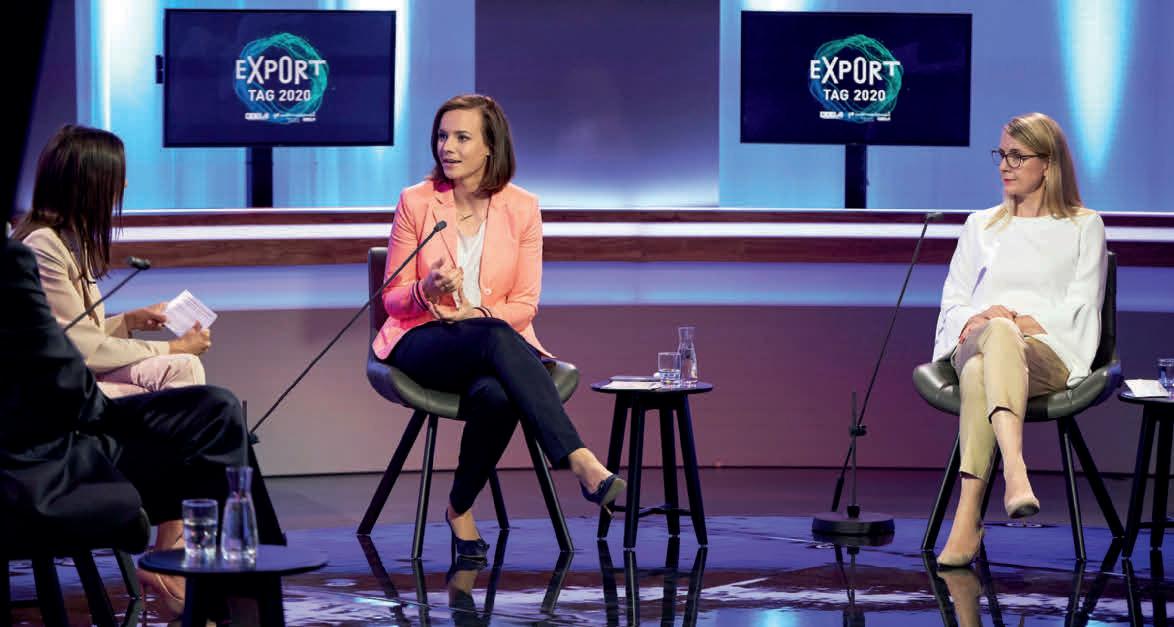
4 minute read
The highlights of this year’s virtual Export Day
The annual get-together of the Austrian export trade agency Advantage Austria became a plea for open markets and a strong Europe.
The Export Day is considered the annual highlight of Austria’s export trade and is Advantage Austria’s most important event. This year it was held in the digital world due to the Covid crisis. The central topic was kickstarting the Austrian export engine: Where do new opportunities arise? How will the markets develop during and after the crisis? And which subsidies are available to Austrian exporters?
Advertisement
The new economic world order after Covid-19
One of the many illustrious discussion groups talked about the new economic order and recommendations for specific actions among businesses post-Covid-19. Participants were the Minister for Digitisation and the Business Location Margarete Schramböck, Deputy Secretary General of the Austrian Economic Chamber Mariana Kühnel and the keynote speakers Matthias Horx, Parag Khanna and Gernot Wagner. “It is obvious what we learned from the crisis: We need to pay more attention to resilience,” Schramböck said. Global trade will continue to exist, of course, but we need to have an eye on where production is taking place, the Minister added. Kühnel underlined the relief measures of Advantage Austria for the Austrian export sector, supporting businesses with exclusive information through services such as the Export Radar. Austrian businesses are already in a strong position on the global market thanks to their high-quality products and services; this is a foundation to build upon.
Focusing on the European Recovery Fund
The Deputy Secretary General of the Austrian Economic Chamber Mariana Kühnel discussed the European Recovery Fund and the effects on the Austrian economy with EU Commissioner for Budget and Administration Johannes Hahn. The central question was the availability of the new support mechanisms – when would they come and which sectors would be eligible. “The main task is to restart the Austrian economy, which is of course closely connected to the European economy,” Kühnel said. “80 percent of the rules and regulations that affect our businesses come from Brussels.” Johannes Hahn stressed the importance of securing the supply chains of European key industries and productions, and called for more courage when it comes to taking risks in order to continue being economically successful after the Covid crises is over.
Photo: WKÖ EU Commissioner Johannes Hahn joined the Export Day via a live link.

Deputy Secretary General of the Austrian Economic Chamber Mariana Kühnel and Minister for Digitisation and the Business Location Margarete Schramböck on the main stage
EU trade policy
“We have always supported the European Union and are always going to support it so that it can keep its leading role in promoting free and sustainable trade in the face of misguided protectionism,” says Jürgen Roth, Vice-President of the European trade representation EuroCommerce in a video conference with EU Trade Commissioner Phil Hogan. “If there is one thing to learn from the developments over the last few months, it is to keep the markets open,” he told Hogan. “The European retailers and wholesalers are operating all over the globe, either as exporters of goods made in Europe that are in high demand or as importers where they help give consumers a large choice of the world’s best products.” Roth also believes that “the EU trade policy will focus more than ever on the opportunities of the digital world. The EU’s digital agenda needs to help our companies to grow and to find new opportunities on the global market through electronic trade.”
Eurochambres President Christoph Leitl underlined Europe’s position in the world on the virtual main stage: “We can overcome all global challenges with a strong common market and as many free trade deals around the world, supported by European innovation and qualification,” he said. It is now of utmost importance that the European Union supports businesses and that this support comes as quickly as possible. ◆
2019 in exports
Last year saw exports grow by 2.3 percent. Due to an increase in imports by 1.1 percent, the trade deficit went down. The export of goods amounted to 153.5 billion euros and the imports to 157.82 billion euros, reducing the trade deficit from 5.99 billion euros to 4.23 billion euros.
The export of goods to the European Union went up by 1.9 percent to 106.94 billion euros, imports from the EU grew by 0.3 percent to 110.66 billion euros. Foreign trade with countries outside the EU increased even more: Exports went up by 3.2 percent to 46.56 billion euros and imports grew by 3.1 percent to 47.16 billion euros.
More than half of Austria’s foreign trade in 2019 took place with the five countries Germany, Italy, United States, China and Switzerland. Just 20 countries make for 85 percent of all imports and exports; this includes all neighbouring countries except for Liechtenstein. Business with Australia went up by 20.6 percent, replacing South Korea in the top 20 of the most important trade partners.










